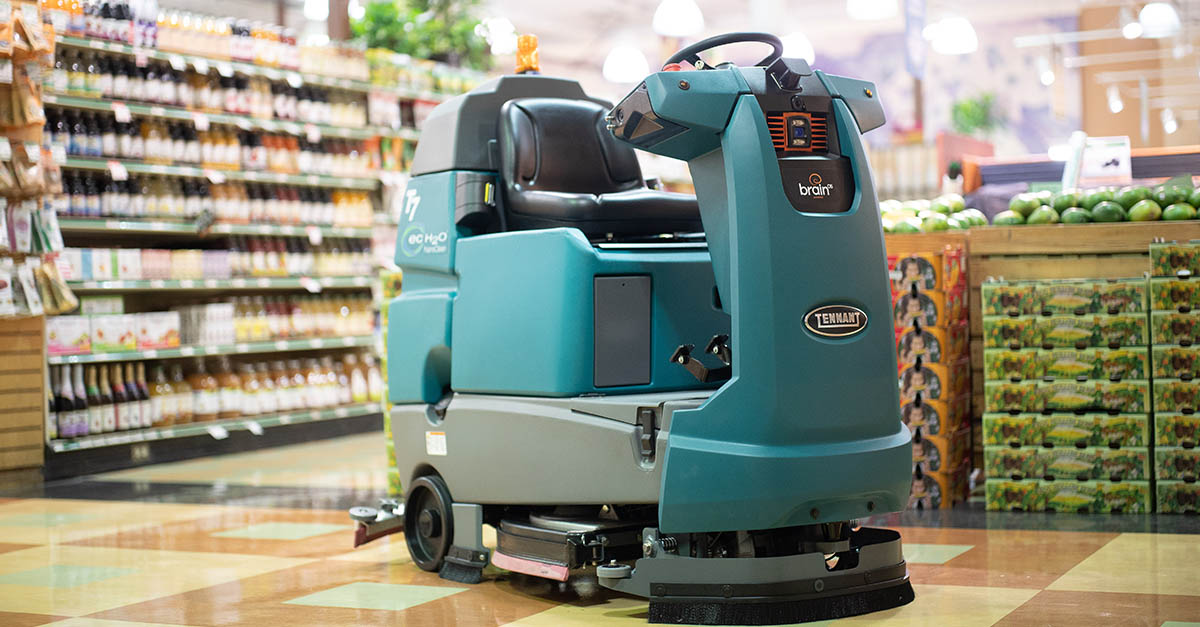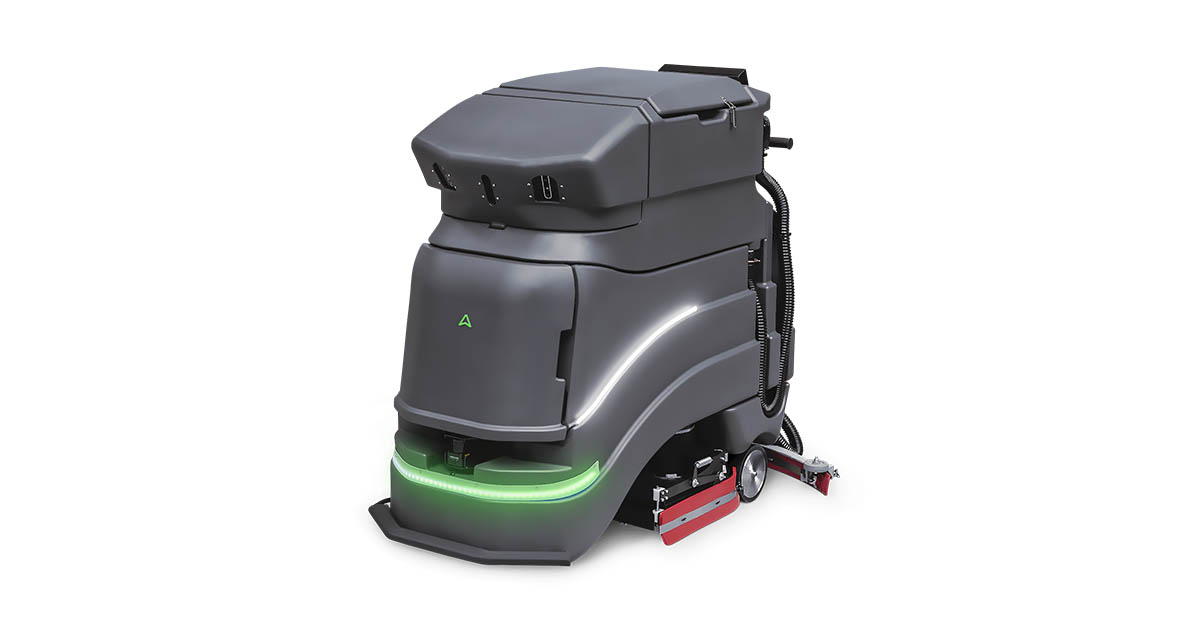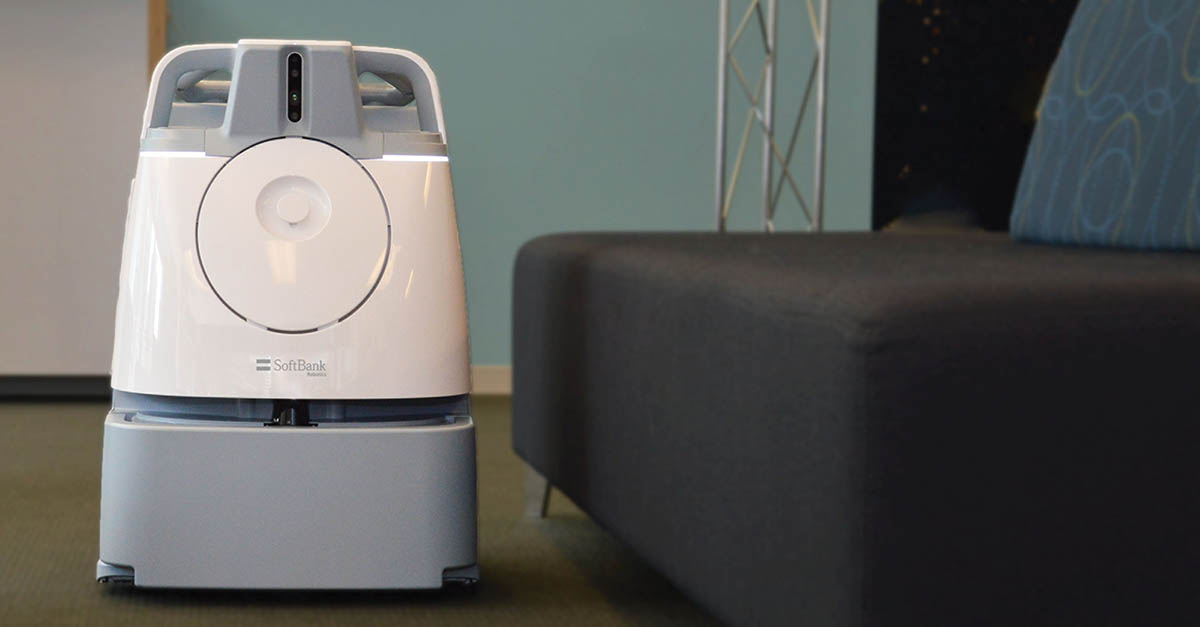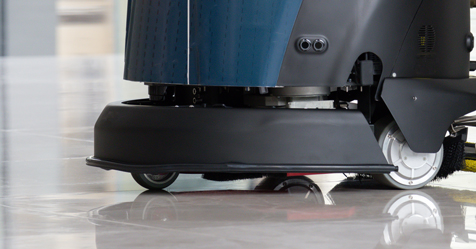Makers of autonomous cleaning equipment like floor-scrubbing robots, sanitizing robots, and vacuum sweepers are seeing an uptick in demand as the need grows for more frequent and thorough cleaning and disinfection of public buildings due to the coronavirus pandemic.
Equipment manufacturers report that not only are robots being deployed to help with increased cleaning requirements and frequencies, but they are also playing a key role in keeping custodial staff safe by autonomously cleaning areas that might be infected by SARS-CoV-2, the virus that causes COVID-19.
“We see facilities managers using two main types of cleaning robots during this pandemic: autonomous floor-scrubbing robots like ours, as well as sanitizing robots that spray disinfectant or emit ultraviolet (UV) rays to clean walls and surfaces,” CEO of Ontario-based Avidbots Faizan Sheikh says. Avidbots has seen a 100% increase in demand for its floor-scrubbing robot compared to the weeks before the coronavirus spread outside of China.
Brady Watkins, head of commercial automation at SoftBank Robotics in San Francisco, says their vacuum cleaning robots are also helping short-staffed teams take on repetitive tasks like vacuuming so that they can spend more time on disinfecting high-touch areas such as handrails or sanitizing tabletops.
“We’ve also seen light-based sanitizing as well as floor-scrubbing robots on the rise, and robots that don’t directly clean but enable physical distancing like food service, inventory scanning, and delivery or logistics robots,” Watkins says.

BrainOS-powered autonomous mobile cleaning robots are manufactured by original equipment manufacturers (OEMs) like Tennant Company (pictured). Image courtesy of Brain Corp.
Where are robots cleaning?
While many buildings have been shuttered during the pandemic, cleaning robots have proven useful in facilities that have remained open for essential business including hospitals, airports, transit stations, grocery stores, and warehouses. From sanitizing to sweeping, these machines play an important role in regularly and consistently cleaning to help stop the spread of the virus.
Alan Butcher, vice president, Global Client Services, at San Diego-based Brain Corp, says BrainOS-powered autonomous mobile cleaning robots, manufactured by original equipment manufacturers (OEMs) like Tennant Company, Minuteman International, and others, are being used more frequently during the pandemic, especially in grocery stores, retailers, and other essential businesses across the U.S. In fact, robotic floor care usage at retail locations spiked 13.6% in March 2020, compared to March 2019, and 13% during the first quarter of this year, according to Brain Corp network data. While Butcher says that some verticals have slowed down, like malls and airports, to a degree, cleaning is still a huge priority and will remain so.
In February, Forbes reported cleaning crews at Los Angeles International Airport (LAX) were using disinfecting robots to kill germs with UV light on inbound planes from China as the coronavirus began to spread in the U.S.
According to recent reports, Pittsburgh International Airport became the first U.S. airport to deploy self-driving robots equipped with UV lights to clean high-traffic floors. The scrubbers scour the floor surfaces with 88 pounds per square inch of water pressure, then pass over the floors again with chemical disinfectant. A third pass utilizes UV disinfecting rays, completing three different levels of cleaning. In addition to deep-cleaning floors, airport officials are looking to incorporate UV technology into disinfecting other high-touch surfaces such as escalator and moving walkway handrails and elevator buttons.

Avidbots’ Neo is an autonomous floor scrubbing robot designed for airports, warehouses, manufacturing sites, malls, and universities. Image courtesy of Avidbots.
What special measures are robots tackling during this pandemic?
COVID-19 has changed the game on ensuring, with as much certainty as possible, that facility managers are keeping their tenants and visitors safe, Watkins says, noting that robots can make sure something gets cleaned—whether by vacuuming or killing viruses and bacteria with UV light—and can provide proof of such a task.
“We’ve seen the rate of cleaning with robots like our autonomous sweeper increase in this time—seven-day cleaning weeks with five-day robot schedules. I only expect that to ramp up as stay-home orders start to end,” Watkins says.
Butcher says that facility managers are using robots to help offload some of their work, so their teams can focus on tasks only humans can do, such as sanitizing high-contact surfaces, restocking, supporting customers, and even taking a much-needed break. This is especially true in retail and other essential business, he says.
“Our autonomous floor care robots are now providing 8,000 hours of daily work—equal to more than 250,000 hours over the next 30 days—that otherwise would have been done by an essential worker. This is valuable time given back to employees that they can use to be more productive and focus on sanitizing and disinfecting,” Butcher says. “Cleaning has never been more important, and robots help make facilities managers and their crews much more productive.”
In hospitals around the world where Avidbots autonomous floor scrubbing robots are deployed, facility managers are adding a cleaning solution to the robots’ clean water tanks to stop the spread of COVID-19, Sheikh says, ensuring that floors are sanitized.
Xenex, a San Antonio, Texas-based company that sells robots that use pulsed xenon UVC light to kill pathogens, has deployed its robots to clean rooms at facilities with suspected cases of COVID-19, according to Forbes. Studies have shown the implementation of pulsed xenon UV disinfection is associated with significant decreases in health care-associated infections (HAIs).
“Workers are being asked to clean deeply and more often, disinfect high-touchpoint surfaces constantly, while also stocking shelves at faster rates as goods are being sold more quickly. The robots are helping workers now, and over the long-haul, to increase productivity by taking over things like floor cleaning and delivering goods from point A to B, so [workers] can focus on these other tasks,” Butcher says. “As the data shows, the value of robots and automation is coming sharply into focus during this crisis. Robots can provide a huge assist in supporting front-line workers.”
While cleaning robots free staff up to do other activities, experts agree the most important benefit during this pandemic is that robots help reduce human-to-human interaction, so employees can keep a safe distance while working together to sanitize spaces.
“The main benefit is keeping maintenance staff out of harm’s way as much as possible. Cleaning robots can enter areas that may be infected and clean them without a human present,” Sheikh says.

SoftBank Robotics’ Whiz is an autonomous vacuum sweeper designed for commercial and industrial use. Image courtesy of SoftBank Robotics
Is now the time to invest in autonomous equipment?
In a time of such uncertainty, facility managers may be putting off new investments. According to the 2020 CMM In-House/Facility Management Survey, only 8% of respondents currently use autonomous equipment in their facilities. The survey showed 20% who don’t use it are considering implementing it in the future.
Experts say now could be the best time for facility managers to begin incorporating robots into routine cleaning not only to help support their workforce, but also to show the public they are advancing their cleaning programs and doing so with new technology.
“Now is a great time to start determining the plan and resources, such as automated solutions, you will deploy to ensure your tenants feel safe once they do return to your facility,” Watkins says.
Butcher agrees. “Cleaning has never been more important, and robots are a key support tool for the workforce, especially in the areas of cleaning and sanitation, which are well aligned to characteristics of robots (methodical, efficient, autonomous, and reliable). Autonomous robots are easy to deploy, requiring no customized infrastructure or specialized training, and they help businesses meet customers’ evolving standards, both today in the future.”
Sheikh says, “Robots are here to help maintenance staff, not replace them. This crisis has shown that robots will be an integral part of the cleaning process forever going forward.”




